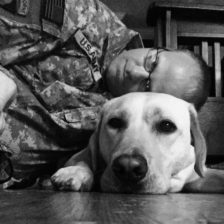If you are a Veteran in crisis or know a Veteran in crisis, please call 1-800-273-8255 and Press 1.
Send a text message to 838255 to receive confidential support 24 hours a day, 7 days a week, 365 days a year.
National Suicide Prevention Lifeline: 1-800-273-8255. If you are struggling, please reach out for help.
Given the recent events of this week, suicide is clearly an important topic to discuss. By now, you’ve probably read or watched a news story on Kate Spade and now Anthony Bourdain this week.
These and other deaths by suicide are reminders, tragic reminders, that mental health issues do not discriminate based on income, success, gender, race, age, profession…mental health diagnoses, the struggles of them, and living with them are very, very real.
I read an article today that stated a study published by the U.S. Centers for Disease Control and Prevention found that suicide rates are climbing and that they have increased by more than 25 percent since 1999.
I sat in on a meeting and listened to the Suicide Prevention Coordinator at the VA give statistics. He said that of the “20 Veterans a day” who take their life, only six out of the twenty are in VA healthcare. Their program is trying to be more proactive, and get Veterans and their families the help they may need.
What struck me as alarming, from the article, and upon thinking more about this topic, around 54 percent of people who died by suicide in 2015 had no known mental health condition, meaning that they were likely going untreated or dealing with some issues on their own. This could be relationship problems, money trouble, job loss, or other personal crises.
So, now what do we do? We read of these deaths and we often hear about the “20 a day,” but what can we say is being done about that?
I think there needs to be a better dialogue, a conversation. It is time to talk about suicide. It is time to talk about mental health. It seems the conversation happens, a motivation, if you will, to be proactive and “do something” only happens when it is too late.
If you sit and think about this issue, you may know or may be directly affected by suicide. Today I sat and listened to a group of people speak about how they have been affected: a step-father lost his step-son, a soldier lost a fellow soldier, a big brother lost his younger brother, and then I started to think about how I have been affected…
Sam has lost many soldiers, men he has been deployed with to suicide. I recalled the phone calls, text messages, and ways he found out about their deaths.
Crisis. We were all surrounded by it in some way, shape, or form.
Self-harm can happen to someone you know. Being honest and open about the word suicide may be difficult, but I think it is something we (society, sisters, brothers, parents, spouses, you get the idea) need to do, we need to have this conversation. Suicide isn’t just someone else’s problem, it’s everyone’s problem.
If we could sit and have caring conversations, would that help? Discussing health problems should not be shameful. Depression is real. Anxiety is real. If we can openly talk about terminal diseases, why can’t we just start talking about suicide?
Conversations and opening up about experiences you may be going through can help. Last Saturday, in a room full of people that we didn’t know very well at all (okay, we knew some people well, but there were some people who were complete strangers), Sam opened up and talked about how he almost became a statistic. He could have been one of the twenty Veterans who took their own life.
But, he found people who cared. He met people who were aware, who knew he was going through a difficult time. He entered a conversation, a journey to healing. He avoided a crisis.
If we tried reaching out to those who are struggling with mental health like we do those who are struggling with a physical illness, would that help? If we showed support if we actively listened if we cared.
Leave your bias at the door. Don’t become a preacher and start giving the “what for” to someone who is struggling and feels that their life is in crisis. Become uncomfortable, be open to hearing about someone’s pain and struggles, and help them. Let them get the help they need.
Suicide is serious. Period. Mental health is a thing, folks. You shouldn’t tell someone to “just get over it,” and you shouldn’t minimize or deny a conversation about mental health. Is it fun hearing about depression, anxiety, and suicide? No. Is it hard to listen to someone pour their heart out to you about the struggles they face, about how getting out of bed each day is a win, how facing down demons take a toll? Yes, yes it is hard. But, when someone chooses to open up to you with those struggles, be an active listener.
I read an article from NPR about Anthony Bourdain. One of the things he said about his job, experiencing food in the purest and emotional way. When he spoke about what made him happy, he said, “Journalists drop into a situation, ask a question, and people sort of tighten up. Whereas if you sit down with people and just say, ‘Hey, what makes you happy? What do you like to eat?’ They’ll tell you extraordinary things, many of which have nothing to do with food.”

